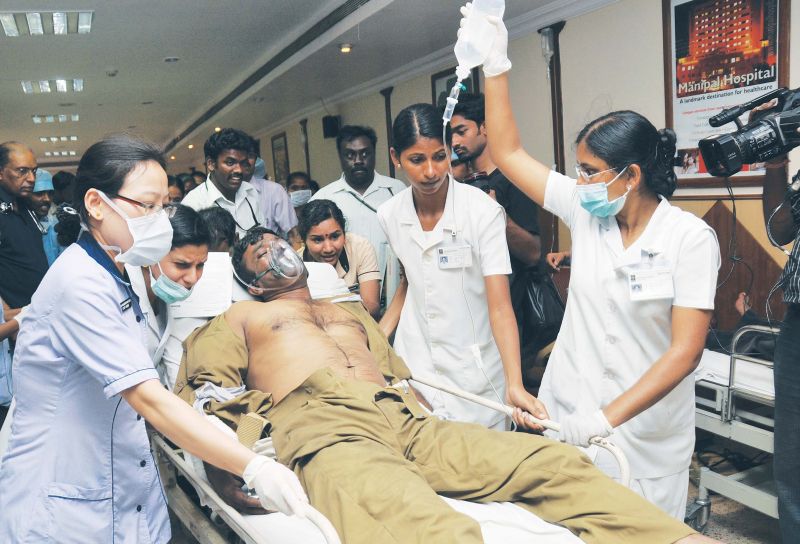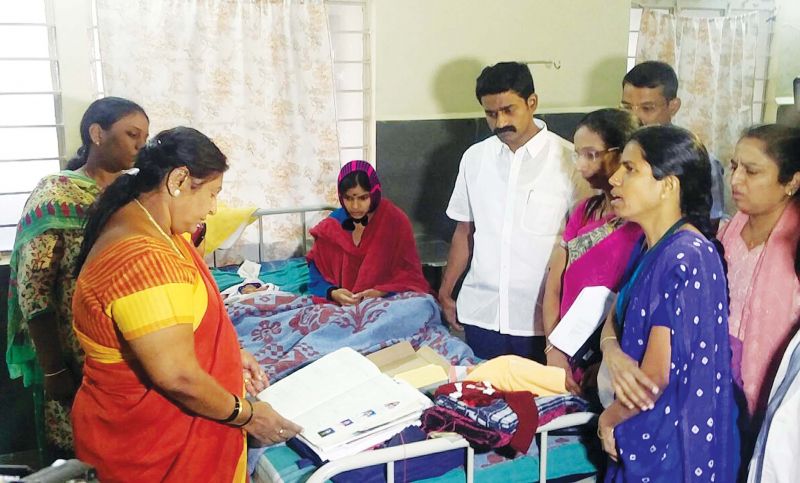Indian healthcare needs an X-ray

Nearly everyone has experienced the following at one time or the other: doctors prescribing expensive tests when they don’t require them. But with little information to go on, patients do as they’re told and are presented with a huge bill at the end of it all, that goes into the hospital’s kitty.
While healthcare has become more sophisticated with hospitals offering the latest gadgets to help the sick in the country, sadly some fleece patients in the name of treatment. "It is the same everywhere. We need to rely on what the doctors tell us as we don’t have enough information to go on and pay for all the tests that we are asked to do even for a simple stomach ache. This not only leaves us poorer by quite a bit but also makes us anxious as we begin to wonder if we are seriously ill," complains Mr Nitin Gupta of C V Ramnagar in the city, speaking from personal experience.
He believes hospitals should post information about their bed, room and test rates to help patients pick what they can afford . “But at the end of the day it is all business,” he laments.
While transparency in the healthcare system has a long way to go, the policymakers don’t seem to have woken up to the problem as yet in the country, leaving patients at the mercy of hospitals looking to make money at their expense. A recent study covering 32 countries and released on April 13 by Klynveld Peat Marwick Goerdeler ( KPMG) a global network of firms providing audit, tax and advisory services, with its heaquarters in Netherlands, has in fact, placed India in the bottom five in the transparency index in the healthcare system.
While its overall transparency score was 36 per cent, India achieved its highest transparency score for healthcare governance (44 per cent), personal healthcare data (43 per cent), and finance (42 per cent). “It is not surprising that India ranks low, but our intent here is not the ranking, but aiding the designing of a better healthcare system. Key players and policymakers can look at the parameters and try to work towards this," says Mr Nilaya Varma, partner and COO of Infrastructure, Government and Healthcare (IGH), which is part of the KPMG in India.
The study covered some 100 hospitals, both public and private, he reveals. "Once we had designed the survey, we went to each country and identified the set of hospitals, focusing on those had a huge bed capacity, and were certified by NABH. Then we went through all the available information regarding them," he explains.
Mr Varma say there are two areas that the KPMG feels strongly about. “Firstly, the quality of care. Sadly, there is hardly any information available about it and most of it is anecdotal and word of mouth. Secondly, none of the hospitals have a robust pricing detail and the consumer or patient is mostly left confused about where their money is going and how much more would be needed. This kind of confusion can be easily solved with proper information posted online," he says
India’s health system is unique, according to him, as it continues to grapple with the dual burden of high disease prevalence and large out- of- pocket payment for healthcare. "With the dominance of the private sector in healthcare delivery, the institutionalisation of transparency measures continues to be a challenge," he notes. Strongly emphasising that the government needs to take the lead in making India’s healthcare system more transparent, he says it is important to link performance of health facilities with incentives and develop a central repository of information for the public.
‘Doctors need a more sympathetic approach’
Responding to the KPMG study ranking India among the bottom five in healthcare transparency, some health experts here say it cannot be the only parameter to judge its healthcare system by. “India has today become visible when it comes to healthcare delivery,” they observed.
"We feel sad about our ranking as we have become a healthcare hub and patients come to our hospitals from all over because of the low cost involved. I wish the survey was more extensive and not just focused on the financial aspects,” said Dr BS Ajaikumar, chairman of HCG and president of AHPI, Karnataka.
But he agreed that in the interest of transparency every patient should be told about the approximate cost of his or her treatment when entering a hospital. “Also, it is the duty of the hospital to counsel the patient about the cost involved and obtain his or her consent. It should also talk about treatment outcomes, success and failure rates and how it stacks up in terms of global standards. All hospitals, both public and private, should do audits and make the reports available," he suggested.
Dr Kaushik KN, HoD, Medical Operations, Vikram Hospital regretted that hospitals in the country were today cash-driven and lacked the personal touch. “Doctors need to spend more time with patients to establish a connect. The approach should be sympathetic,” he stressed. The doctor pointed out that while in most countries, the general physicians was empowered to take decisions on which super speciality a patient needed to approach, in India the patients directly went to the super-specialty themselves based on their symptoms. “I feel GPs should be empowered here as well and this will also increase the patient confidence in the hospital," he summed up.
Technology might be the answer to transparency, says doc
Dr Raghavendra MS, Consultant Physician and Diabetologist, Founder and Director of Supurva Hospitals believes in transparency and opines that Electronic Medical Record (EMR) and Electronic Health Record (EHR), which is relatively new to India might help solve the problem. "EMR is essential for hospitals. In my opinion, most patients who return to the hospital don’t bring their previous which could compromise their safety if treatment is repeated or altered. EMR can also help reduce healthcare costs by minimising repetitive lab investigations. Doctors and hospitals, who are constantly threatened with unnecessary Medicolegal cases, will find EMR a useful tool as all services are documented, making the process transparent. From the patient’s perspective, he or she should have control of his health care records. It will make him understand his status better, track his progress, and can easily analyse his treatment plans. EMR can also be helpful in unfortunate incidents like accidents, where decision making becomes easier with accessibility to healthcare records. EMR can also help in capturing the disease demographic data
What is healthcare Transparency and why do we need it?
Transparency is a critical tool that can help transform the way a nation’s health system operates. Making information available publically can improve competition among health providers, which in turn can indirectly improve the quality of care.
How do we achieve a proper healthcare system with a more confident patient?
1) The government should develop a basic framework to report on select transparency parameters (such as surgical complications, stand patient satisfaction score, and the like) and adoption of these by individual hospitals can be encouraged.
2) The government could work to improve reporting by public hospitals against these set indicators, which are intermittently verified by third party agencies.
3) A centralised repository of health data for the general population needs to be developed.
4) Efforts to develop learnings through various initiatives on electronic health/medical records or digitalisation
Use ranking to improve quality of healthcare in India
Dr Upendra Bhojani,Assistant Director, Institute of Public Health(IPH)
These global surveys need to be sophisticated and tailored differently for different countries . So in my view this study needs to be taken with a pinch of salt. It is not enough to just go by a few parameters as a health system evolves historically depending on the political scenario as well. When doing a study one has to pay attention to the political values in which the health systems operate. Just a ranking or comparison with other countries cannot be scientific because in some contexts countries are incomparable. For instance, you cannot compare India to the Nordic regions where the health system is completely different. Such comparisons can be a futile exercise.
But having said that, India needs to focus on its quality of healthcare, patient experience, finance, and governance and communication of personal healthcare data. Our health system should be able to provide accessible, reliable, useful and up- to- date information to all interested stakeholders to help them understand it better and empower them enough to make judgements. This should be the goal of the government and both the public and private hospitals. They should be in a position to help the patient make the right decisions. Why doesn’t a patient want to go to a public hospital? Why can't we trust it as much? Why are private hospitals not clear about their pricing? These questions need to be answered and effort should be made to build confidence in the healthcare system among patients.



